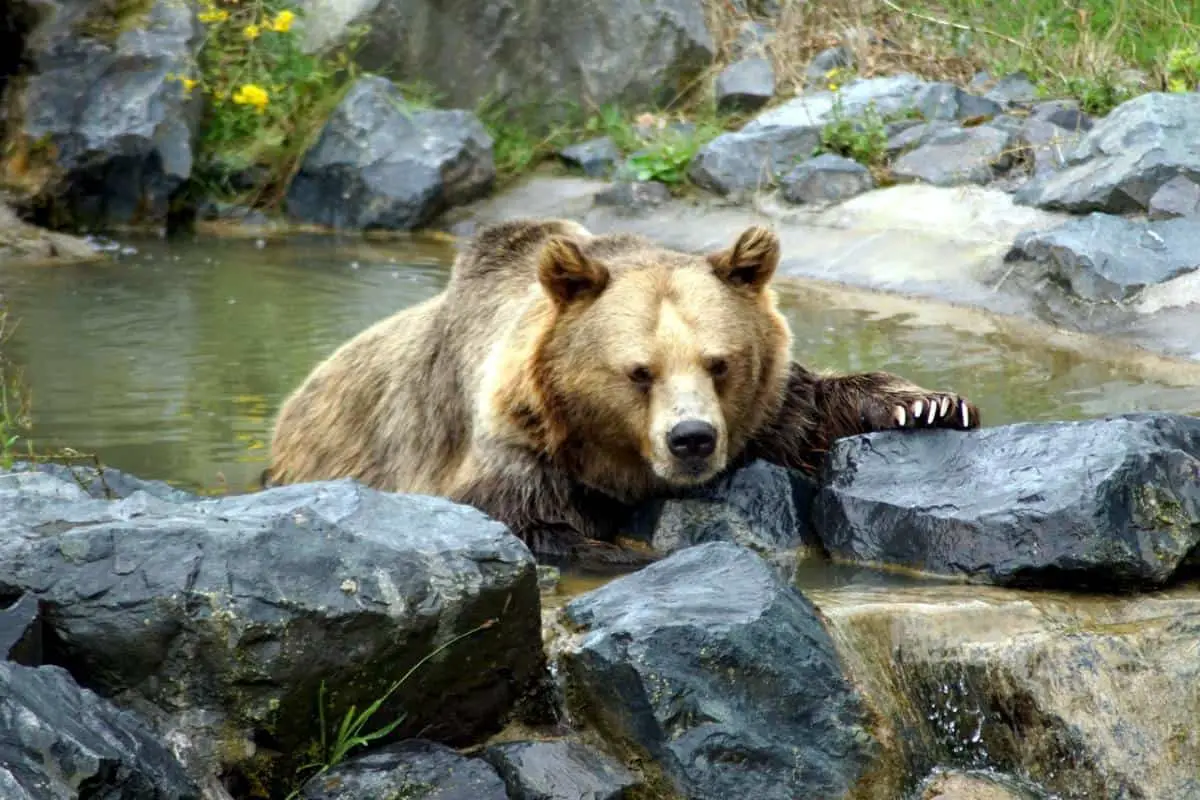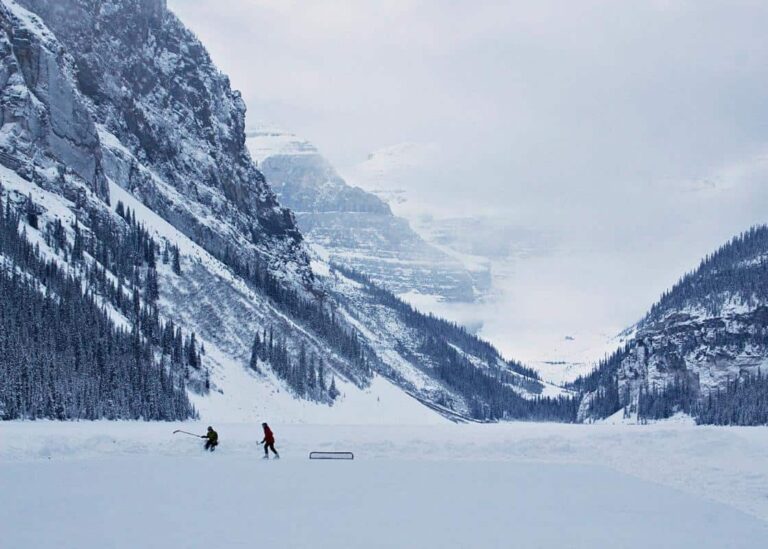Dos and Don’ts of Fishing Among Bears in the Rockies

For anglers, there is little better than fishing in the Rocky Mountains. There is one disadvantage, however. You are in bear country. So take into account a sudden encounter with a bear. How do you deal with this?
The fast-flowing river in front of you is rustling so loudly that the washing water is the only thing you hear. You only notice a bear is getting closer and closer when it’s not far away from you anymore. It quickens its pace and runs straight at you. What to do! Make noise, run away, hurl the fish you caught in its direction?
Of course, you hope to never get in such a situation, but if you are well prepared for a bear encounter, you reduce the risk and know better how to handle the situation. That’s why I especially recommend you read on. You’ll get a few valuable tips.
If you want to know more about fishing in Banff National Park, click the link and read everything you need to know, from the permits you need to booking fishing tours on Lake Minnewanka.
Dos and Don’ts of Fishing in Bear Country
You need to know several essential dos and don’ts if you want to fish in bear country. Some of these tips are obvious, others a little less so, but they are all good to know. You’ll find them below.
DOS
1. Make noise. Many bear attacks occur because you have startled the animal with your sudden presence. Therefore you must make noise. That way the bear can hear you are nearby and it won’t be surprised. Shout, clap or sing, or do it all. And do it with the necessary volume, especially if you are fishing in a fast-flowing river, as it can be challenging to make enough noise. The water usually makes so much noise that it easily drowns out other sounds, like stepping on dry branches or a splash in the water. Even a bell attached to your fishing gear is not enough. In fact, some bear experts think it can lure a bear.
Making noise is easier said than done because the relaxing nature of fishing and the beautiful surroundings make you forget that you regularly have to make noise. So be aware of this.
2. Make sure you have bear spray with you. This is, of course, a no-brainer. It’s the most effective way to repel a bear attack without killing the bear. Research has shown that bear spray was effective in 94 percent of the attacks studied where bear spray was used.
Aslo make sure your spray is ready to use though. Carry the spray somewhere on your body so you can grab it immediately. And make sure you have figured out how to use the spray beforehand. Be careful, because if the wind blows in your direction, the spray might get in your face instead of in the bear’s face.
If you want to know more about bear spray, click the link. It’ll lead you to the article which explains everything you need to know about bear sprays.
3. Fish with someone else. Two people know more than one, but see, hear and smell more than one, too. In other words, make sure you fish with others. With two people, three people, or more. This way you are sure to make more noise (which often deters a bear), and you have a much better chance of noticing the presence of a bear in time.
Two or more people also appear more threatening and you have a greater chance of repelling a bear attack. At least you will be able to tell your story afterward. And you will have a nice anecdote to recount every year around Christmas time.
4. Tell someone where you are going fishing. Let someone know where you plan to fish. In case something happens, at least others will know where to start looking for you (sorry, this sounds a bit lugubrious), should you not return in time.
5. Talk to a park superintendent. Park superintendents know a lot about bears. They are usually aware of recent bear activity and often know which bears are dangerous and where they hang out. In short, no other person is better informed about bears in the area. Another source of information is the Visitor Centre in Banff or Lake Louise. The staff can usually tell you something about bear activity and what it’s like at the spot you want to fish.
Visitor Centres
BANFF VISITOR CENTRE
Opening hours (daily): 9 am – 5 pm
Phone: +1-403-762-1550
E-mail: pc.banff-vrc.pc@canada.ca
Address: 224 Banff Avenue, Banff
LAKE LOUISE VISITOR CENTRE
Opening hours (daily): 9 am – 5 pm
Phone Number: +1-403-522-3833
E-mail: pc.lakelouiseinfo-infolakelouise.pc@canada.ca
Address: Samson Mall, 201 Village Rd, Lake Louise
6. Reduce your chances of a bear encounter. Try to go to your fishing spot during daylight hours. That way, you reduce the risk of encountering a bear. And while fishing, always pay close attention to the bushes, upstream and downstream.
7. Be vigilant. Keep your eyes open for bear tracks on the way to your intended fishing spot. Look for paw prints, claw marks on trees, torn tree trunks, droppings, and newly dug pits. Or moved rocks. And look around you and behind you regularly, especially if you’re fishing in or near a fast-flowing river. The sound of the washing water means you won’t hear a bear coming.
Choose your fishing spot strategically. Avoid places where dense vegetation makes it hard to see what’s happening in front of you.
8. Stay alert. You are used to focusing on the water while fishing. It makes it easy to forget the world around you. But you will still need to look around you from time to time, especially behind you. Try to do that continuously. After all, you want to avoid noticing a bear only when it’s already close to you.
9. Be aware of your surroundings. If you have found an excellent fishing spot, it is good to realize that you can encounter a bear. Because if you can walk to the site, so can a bear. Above all, if you fish in the same river or lake as a bear, chances are it will want to fish in the same spot.
10. Provide as few lures as possible. Bears have a highly developed sense of smell and are often attracted to people by the scents they spread. Therefore, leaving strong-smelling food and strong-smelling drinks and toiletries at home is essential. If you have food with you, hang it in a tree at least 100 meters from your fishing spot at a considerable height. In addition, store your food in bear-proof containers or bags, such as the Ursack Major. Check out the current price on Amazon here. Or the Frontiersman Bear Safe & Resistant Food Storage Container. Check this price here.
11. Don’t leave caught fish on the bank. Instead, hang it in the water on a string and keep a close eye on it (a bear may be interested in it). Or throw the caught fish back into the water. If you want to take the fish home, clean it at home. Don’t do it at your fishing spot.

DON’TS
1. Flee. Don’t flee when a bear approaches you. Even when attacked. Yes, it goes against your grain, but a bear runs much faster than you do. Besides, it will be behind you, so you can’t see how far away you are from the bear. Try to chase it away by yelling loudly and making big arm movements. Also make sure you have your bear spray ready.
2. Giving the bear your fish. When you give a bear your fish in hopes of distracting him, you teach the bear to associate people with food. It turns this bear into a “problem bear”, which can later put other people in danger as well. In most cases, the bear will have to be put down. Throw your fish into the water. In this case the bear will not be able to pick up a distinct fish scent near you.
If the situation permits, also wash your hands in the river water to have as slight a fishy smell on your hands as possible. Preventing fish odor on your body is difficult, especially for fly fishers. Your wading suit, vest, and clothes can smell like fish too!
3. Smoke fish or store food near your camp. This ties in with point eleven of the dos. Keep all odor-spreading drinks and food far away from your fishing spot. It will prevent you from attracting bears. It goes without saying that you should not smoke fish or prepare other meat on your fishing spot either.
Essential Gear for Your Fishing Trip in Bear Country
When you go fishing in bear country, some items should not be missing from your equipment. And I am not talking about your fishing equipment. With these items, you ensure maximum safety and the ability to extricate yourself from a predicament concerning a bear.. With these items in your pocket, you can go fishing with much more confidence and a more relaxed feeling, and you can enjoy it better, too.
- First aid kit
- Bear spray
- Portable VHF radio if you know there are (will be) other people around
- Satellite phone
- Emergency radio beacon (PLB)
Click on the items to view the current price on Amazon.
Two Scenarios in the Presence of a Bear
When a bear is present, two scenarios require a different course of action: the bear either sees you or doesn’t see you. If the bear does not see you, leave the area and try to keep an eye on him. If a bear does see you, make big moves by waving your arms and talk to the bear. If you are fishing with others – always recommended – stay close together.
Whatever the scenario, if you see a bear near your fishing spot, try to give him plenty of room. Stop fishing and review your options. Is there a safe place you can go? If you can walk away from the bear, do so. Don’t turn your back on the bear but keep a constant eye on it. Running away is a no-go. By doing so, you could provoke an attack.
What if You Just Caught a Fish at a Bear Encounter?
Splashing fish attracts bears. So if you have a fish on the line and a bear is approaching, cut your line or give it some slack to reduce or stop the splashing. You can also try throwing the fish into the water quickly, especially if you notice that the bear does have an appetite for your catch. If the bear stands on his hind legs, it does not necessarily mean it’s aggressive. It may be curious and try to smell you or gauge the situation.
What to Do if the Bear Spray Does Not Deter the Bear?
If your bear spray does not deter the attacking bear, make sure you remain still or lie down on the ground and pretend to be dead. While doing so, protect your neck and head with your arms and hands. The bear will likely no longer see you as a threat and will probably leave the scene. Do not get up immediately if the bear has ceased its attack and appears to have disappeared. The bear may be watching you to see if you are still a threat. So stay still on the ground for a while and use your ears carefully.






